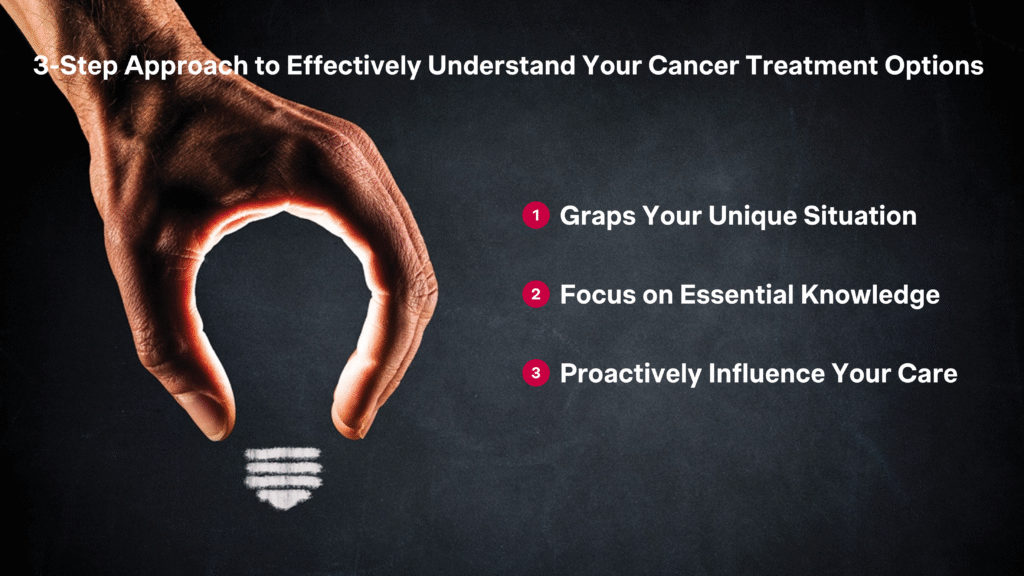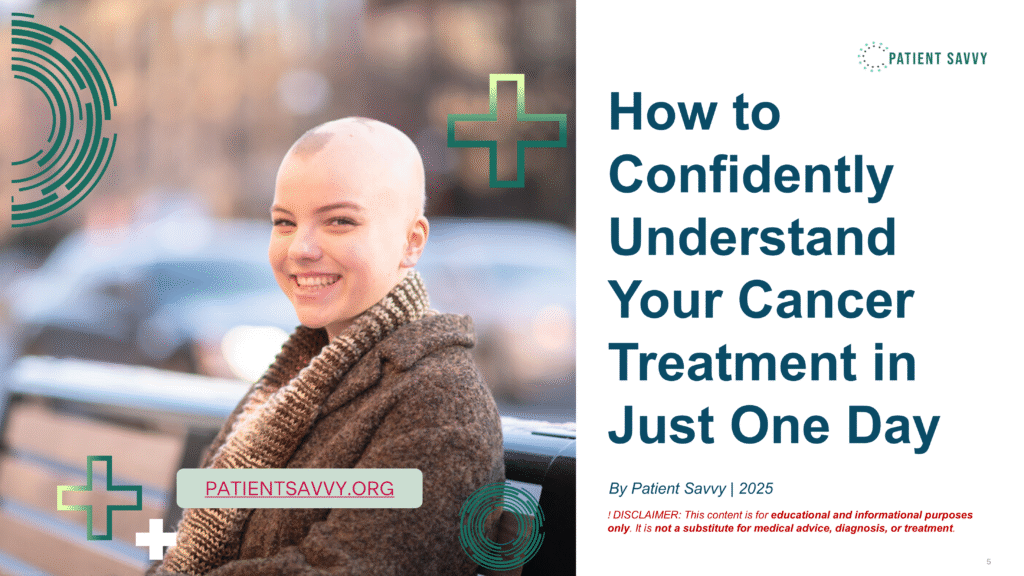Receiving a cancer diagnosis can feel like an earthquake, shaking every corner of your life. Whether you’re an academic researcher or someone who rarely picks up a medical article, cancer’s complexities—the flood of new terms, difficult choices, and emotional stress—can leave anyone feeling lost and helpless.
Most people initially try to make sense of their diagnosis by diving into research, only to hit walls:
- Academically inclined patients often get stuck in technical details that, while accurate, don’t provide the clear direction needed for critical decisions.
- Patients without medical backgrounds frequently turn to Google or social media, finding fragmented or overly simplified information that can lead to confusion or misinformation.
Both paths underscore the same truth: cancer is complex. While it’s natural to rely heavily on doctors for answers, there’s significant power in becoming an informed participant in your own care. With the right approach, you can confidently understand and influence your treatment decisions quickly, potentially saving months of stress and uncertainty.
Here’s a simple yet powerful 3-step approach to help you confidently navigate your cancer journey:

Step 1: Grasp Your Unique Situation
Every cancer journey is distinct. Start by clearly defining your own circumstances; this gives you a solid foundation for meaningful conversations with your healthcare team:
- Your Diagnosis Explained: Clarify with your healthcare team your cancer’s type, subtype, stage, and whether it has spread. These details directly affect your treatment options and prognosis.
- Evaluate Physical Health: Consider your age, general health, and any existing medical conditions. These factors will determine potential treatment restrictions and the need for additional palliative care support.
- Mental and Emotional Preparation: Assess your emotional strength and resilience. Psychological readiness is critical—research consistently shows better outcomes when emotional health is prioritized. If you need professional mental support, highlight this with your oncologists from the outset.
- Financial Readiness: Understand your insurance coverage and anticipate financial impacts early. Preparation here can significantly ease stress. Some hospitals offer social workers who can provide support if you have financial concerns.
Clearly defining these factors helps you articulate your personal treatment goals. Examples of goals you can discuss with your doctors:
- “I believe that I’m ready for the most aggressive possible treatment.”
- “I want treatments that prioritize quality of life and pain management.”
- “Given my mental health history, emotional support needs to be integral to my care plan.”
Your doctor might not fully agree with your goal, but it’s an important discussion to help align your treatment plan. If they have concerns, they’ll clearly explain their reasoning, giving you a chance to adjust your expectations or preparations accordingly.
Step 2: Focus on Essential Knowledge
While the complexity of cancer treatment might seem overwhelming, focusing on the following key drivers will empower you. There are the four main drivers:
- Biomarker Testing: Personalized treatments guided by biomarkers have transformed cancer care, with approximately 60% of recently approved cancer drugs depending on them. For instance, treatments targeting biomarkers like MSI-high or TMB-high tumors often offer better outcomes than chemotherapy alone in colon cancer. Patient Savvy has summarized key biomarkers that you need to know in NSCLC.
- Systemic Treatment Options: Understand the basics of systemic therapies (chemotherapy, immunotherapy, targeted therapy) and how they are used in different lines of treatment (1L, 2L, and 3L+). This helps you anticipate and manage your treatment path effectively. Here is the link to guidelines for different cancers regarding systemic treatment
- Beyond Systemic Treatment: Sometimes, surgery, radiation, and other localized treatments can offer significant benefits, even aiming for a “cure” in stage IV for some cancer types. Make sure that your will discuss these options with a multidisciplinary healthcare team, including surgeons and radiologists. You can find different localized treatment options for different cancers here: [Link to guidelines for different cancers regarding surgery/radiation]
- Lifestyle Factors: Maintaining physical health is crucial during cancer treatment. Align with your healthcare team on diet and light exercise to better manage systemic treatment side effects or recover faster from surgery.
It’s also important to acknowledge the limits of personal knowledge: some treatment decisions must be made by doctors specifically for your situation, as guidelines cannot fully encompass every nuance. This leads to Step 3.
If you still have questions about completing Step 2, reach out to Patient Savvy for further support. We also understand that hearing from other patients who have successfully navigated similar paths can be inspiring. Patient Savvy can also connect you with stories of patients who have thrived long-term with a similar condition.
Step 3: Proactively Influence Your Care
Being actively involved in your care is powerful—research consistently shows that engaged patients experience better outcomes and greater satisfaction. Here’s a few events that you might need a proactively discussion:
- Understand Treatment Decisions: If your treatment plan differs from standard recommendations (as you learn in Step 2), openly discuss the rationale with your medical team. Personalized treatments are common, but clarity reduces uncertainty.
- Manage Side Effects Proactively: Communicate clearly about how side effects like nausea, fatigue, or pain will be managed. Asking these questions early can significantly enhance your comfort and confidence. If you have any rare but severe side effect, visit your doctor / hospital as soon as possible.
- Explore All Treatment Options: Consider local treatments (such as radiation or surgery) for specific tumors or metastases; consulting multiple specialists can provide valuable perspectives. There have been multiple reports of oncologists not proactively discussing surgical options unless patients explicitly asked or insisted on consulting with a surgeon. This issue isn’t about the competency of oncologists. Instead, it highlights the importance of you proactively leading discussions within your multidisciplinary care team.
- Accessing New Treatments and / or Clinical Trials: Ask about experimental therapies or clinical trials. Larger cancer centers often provide early access to cutting-edge treatments, guided by biomarkers and the latest research.
- Discuss Supplements and Interactions: Always clarify if supplements or alternative treatments might interfere with your medications. This ensures you maximize treatment effectiveness safely.
Decode Medical Jargon with Ease
Medical terminology doesn’t have to be intimidating. Here’s how to confidently handle jargon:
- Keep a running list of unfamiliar terms from your consultations.
- Use reputable resources, including online medical databases or AI tools like ChatGPT, and always verify information for accuracy.
- Join patient communities where terms are naturally decoded through regular discussions, providing real-world context.
- Patient Savvy also provides an extensive list of common terms and abbreviations used across various cancer types
Take Control, Feel Empowered
Adopting this structured approach helps you swiftly move from confusion to clarity. Your proactive involvement, supported by essential knowledge and clear communication, transforms your cancer journey from something intimidating to something you can confidently navigate.
You don’t have to be a medical expert to take control of your cancer journey. The power of informed engagement can significantly enhance your treatment experience, reduce stress, and ultimately improve your quality of life.



